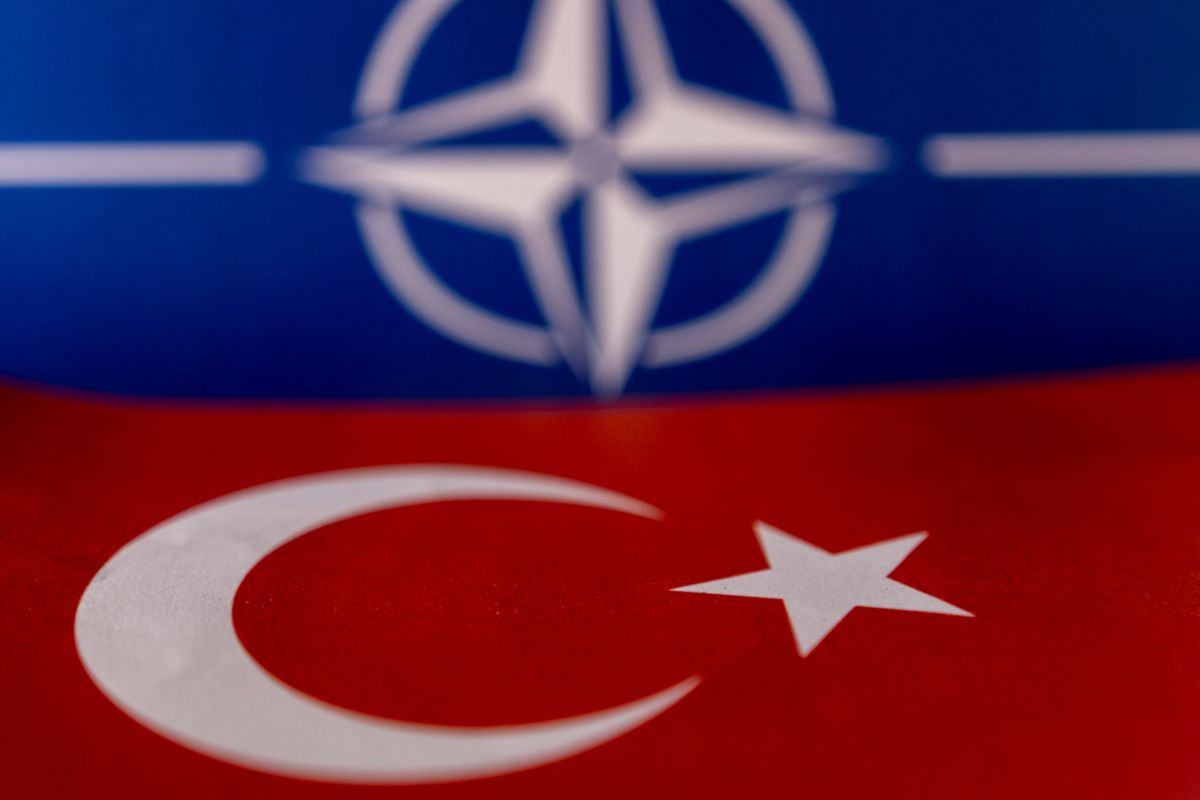Türkiye on Sweden's and Finland's Membership in NATO
President Recep Tayyip Erdoğan of Türkiye is threatening to veto Sweden’s and Finland’s membership application to NATO. He seeks to divert attention from the economic situation in the country and aims to mobilise the conservative-nationalist part of the electorate before the elections in 2023. The arguments of Turkish decision-makers show that the ruling coalition prioritises self-interest over Alliance cohesion even in the face of the Russian threat. The transactional attitude of Turkish decision-makers in the long term will strain Türkiye’s reputation and allied credibility in NATO.
 DADO RUVIC/ Reuters/ FORUM
DADO RUVIC/ Reuters/ FORUM
On 13 May, Erdoğan announced that Türkiye [as of 1 June, this is the formal new name for Turkey in English], a NATO member, would not agree to Sweden and Finland joining the Alliance, claiming that they were countries “home to many terrorist organisations”. In addition, he stated that Türkiye could not repeat the “mistakes” it made over 40 years ago in agreeing to allow Greece in NATO. The next day, İbrahim Kalın, spokesman for the Turkish president, said in an interview with the Reuters news agency that Türkiye had not closed the door on Sweden and Finland joining NATO, but demanded that they start negotiations and “curtail what it considers to be terrorist activities, especially in Stockholm”. On the same day, Turkish Foreign Minister Mevlüt Çavuşoğlu held a tripartite meeting with his Swedish and Finnish counterparts in Berlin. After the meeting, the head of Finnish diplomacy, Pekka Haavisto, expressed his belief that the parties would reach an agreement, and on 18 May, Sweden and Finland jointly applied for NATO membership.
Reasons for Türkiye’s Objections
The country’s stance on NATO enlargement stems from its particular view of terrorism. The Turkish authorities are convinced that internal security is not limited to the borders of the state. Türkiye is increasingly attacking the outlawed Kurdistan Workers’ Party (PKK) and its local branches in Syria and Iraq. Since the failed coup attempt in 2016, the ruling coalition has been working intensively to eliminate the influence of the Fethullah Gülen (Hizmet) movement around the world, a focus which serves to consolidate power around Erdoğan. Many members of the Sunni preacher’s movement were given shelter in the West after the coup, including in Sweden and Finland, where they are active. Moreover, Turkish decision-makers indicate that in both of these countries there are organisations related to the PKK, including the People’s Defence Units (YPG) and the Democratic Union Party (PYD), which played a key role in defeating ISIS in Syria but which the Turkish authorities recognise as terrorist organisations. President Erdoğan is distrustful of the liberal refugee policies of Sweden and Finland and dislikes that there are Kurdish parliamentarians in Sweden. The Turkish side, justifying its position, also indicates that the assumption of power by the military junta and allowing Greece to return to NATO military structures in 1980 was the source of many current disputes with this country, visible in the Greek prime minister’s attempt to block the sale of F-16 fighters to Türkiye during his visit to the United States in May this year. There is a belief in Türkiye that using its veto at that time would have weakened Greece’s current position.
Türkiye’s Expectations
Turkish policymakers made it clear to their allies that they think their security interests are treated as secondary. In view of this belief, they expect Sweden and Finland to end their support for organisations supporting groups Türkiye opposes, to lift sanctions imposed on the Turkish defence industry after the military operation Peace Spring (2019), and to comply with extradition demands and the expulsion of Turkish citizens considered by the ruling coalition to be terrorists. Turkish policymakers are asking Sweden and Finland to take concrete action and are saying that their NATO accession process cannot move forward unless Türkiye’s security concerns are met. Moreover, it can be assumed that the Turks consider Sweden’s and Finland’s eagerness to join NATO as a convenient moment to pressure the United States on the F-16 fighters and 80 retrofit kits for the existing fleet. Second, the Turks may press for U.S. approval of a new military offensive in northern Syria in return for refraining from a veto on accession.
Internal Policy
With the veto threat, President Erdoğan is emphasising an image of a strong Türkiye on the international arena and thus aims to mobilise the conservative-nationalist part of the electorate before the parliamentary and presidential elections in 2023. He also wants to divert the public’s attention away from the economic crisis in the country. According to the official government data, which is probably lower than the actual figure, inflation rose in May to 73.50%. According to independent estimates it was as high as 160.76%. The attitude adopted by Erdoğan is supported by the coalition Party of the Nationalist Movement (MHP). The leader of this party claims that Sweden is the centre of “separatist terror in Northern Europe” and says Türkiye’s withdrawal from NATO should be considered. The opposition accuses Erdoğan of instrumentalisation of the case and claims it is harmful to the country. Meral Akşener from the Good Party (İP) recognises the crisis created by the Turkish president as purposeful and serving the needs of domestic politics. In turn, Ahmet Davutoğlu from the Party of the Future (GP) claims that the incoherent policy of the ruling coalition means Türkiye is losing credibility abroad. In his opinion, decision-makers should ensure proper diplomatic preparation before the NATO summit in Madrid and emphasise that Türkiye is a country supporting NATO’s open-policy, but at the same time demands the elimination of fears related to terrorist activities. According to a MetroPOLL survey from January, 60.5% of surveyed Turks favour Türkiye remaining in NATO. Among AKP supporters, this indicator amounted to 49.7%, which was lower than voters supporting the nationalist group MHP. Among the supporters of the main opposition party, CHP, the figure is higher, at 72.5%. The lower level of support for staying in NATO among the supporters of the ruling party and the high rate of undecided (48.8%) may stem from fear among respondents of being accused of being a supporter of the U.S. Anti-American rhetoric has become popular in Türkiye since the failed coup attempt when the president strengthened the conviction among his supporters about a Western conspiracy against them.
Conclusions and Perspectives
Türkiye’s transactional stance illustrates that Turkish decision-makers are putting party interest over Alliance cohesion despite the threat from Russia. Türkiye’s attitude towards the accession of Sweden and Finland to NATO raises questions about whether Türkiye is a reliable ally, which will harm Türkiye’s image in NATO in the long term. Turks themselves declare that they do not feel any time pressure and state openly that the course of the negotiations will depend on steps taken to address Türkiye’s security concerns. If Alliance countries fail to reach agreement, the accession of Sweden and Finland will drag on and discussions will continue after the NATO summit in Madrid. In the meantime, the likelihood of Türkiye launching a new intervention against Kurdish forces in northeast Syria is increasing, and it will be more difficult for NATO countries, seeking to counter Russia, to criticise Türkiye without risking antagonising it further. In the long term, it can be assumed that President Erdoğan will withdraw from some of his demands and will not raise any objections. This argument is supported by precedent—Türkiye has raised objections before in the NATO forum, only to back down. For example, in 2019 Turkish decision-makers blocked the Alliance’s defence plans in the eastern part of NATO, presenting a demand for greater support in the fight against the YPG, but then adopted a conciliatory position in July 2020. In the absence of consensus between the countries, Poland may use its existing good relations with Türkiye, and in cooperation with partners such as Romania, to continue attempts to persuade Turkish decision-makers to adopt a flexible stance.



